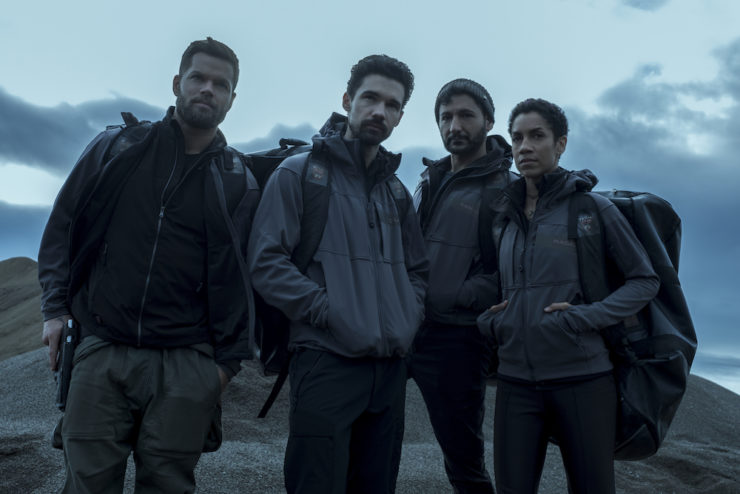FINALLY. It’s been a long wait for season four of The Expanse, and it’s finally here and ready for bingeing. (No one made any weekend plans, right?) After some generally spoiler-free first impressions of the season (tl;dr version: The show remains great!), it’s time to dig in.
(Spoilers for episodes 1 and 2, “New Terra” and “Jetsam.”)
First: the shortest refresher I can manage. Midway through season three, the show’s narrative shifted to the newly formed ring, the giant space gate created by … whatever the protomolecule did on Venus. Humanity went out to see what was what, and what it found was unnerving. When alien intelligences from ages past are making your ships stop dead, things are inevitably pretty strange. People had a lot of ideas (mostly bad ones) about what to do with a big gate into a weird pocket of space, but in the end, they finally tried something new: not using violence. It’s complicated, but eventually Holden (with the help of pastor Anna, journalist Monica, and basically every other character not beholden to Klaes Ashford) convinced most people that the solution was not to attack the Ring, but to roll over and show humanity’s soft, gentle underside.
When we did—when everyone stopped trying to blow things up—1300+ more gates opened. Exactly how the character known as Miller, aka the Investigator, is involved? Unclear, at least on the show. But the Investigator wants to know what happened to its makers, the builders, and the answer just might be beyond one of those ring gates.
I know: that’s the puniest summary. But there’s so much new stuff to talk about.
Episode 1: “New Terra”
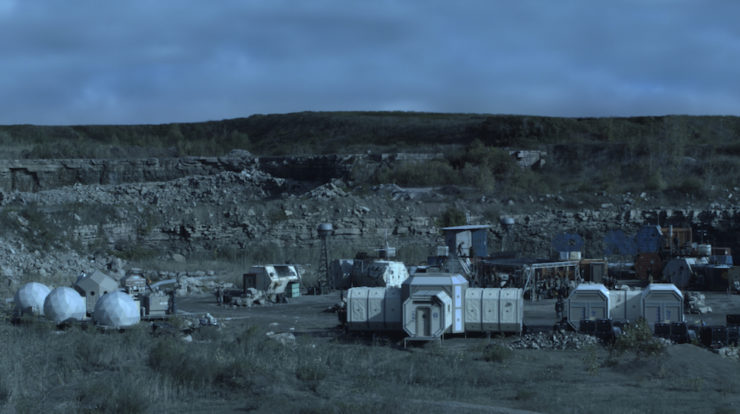
In classic Expanse fashion, “New Terra” opens with characters we don’t know in a scene full of tension. A small gaggle of Belter ships tear toward the Sol Gate, the one that opens from our system into the ring space beyond. Access to the newly opened systems is strictly controlled and they’re taking a huge risk trying to get past the blockade. They’re clever; they use Medina Station, the giant Belter ship that sits guard at the ring, for cover. But it’s not enough to save them all.
On the Barbapiccola, a daughter turns to her parents for comfort, while on a screen, Drummer yells at the UN ship that fired on the Belter convoy. But Drummer also insists that the Belters turn back. They’ve don’t listen; they’ve been begging for a port since Ganymede fell, they say, and no one would let them land. It’s a refugee ship, and it’s still being fired on. So much has clearly gone wrong.
Buy the Book
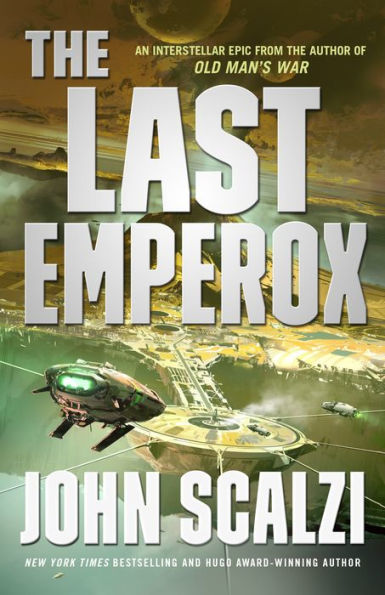

The Last Emperox
The gold rush has just begun, and no one—or at least very few people—realize how dangerous it could be. Holden is the only person who experienced visions in the ring station, and he sounds bananas when he explains; only people who trust him are going to listen to his stories about fallen civilizations and burned-out systems. (As Drummer wryly explains about the last major crisis, they’re all alive “Only because my friend had a boyfriend with an imaginary friend who told us how to power that station down.”)
So much has been kept from people about what really happened since Eros—so much that sounds impossible, or is simply incomprehensible—that you can almost understand Avasarala’s insistence that it’s not safe. That doors being open doesn’t mean we should walk through them. (“Doors and corners,” Miller might say.) Her colleagues point out that the would-be settlers, stopped outside the Ring, are sitting ducks for pirates; they argue about how there are more people on Earth than there are jobs. That people want new opportunities. How can she tell them that James Holden had a vision of something that destroyed planets in seconds, and that might be what’s on the other side?
“I thought he was a madman,” Ashford says of Holden mid-episode. “He turns out to be a prophet.”
“Is possible to be both,” Drummer replies.
And Avasarala wants that madman-prophet to go to the planet those fleeing Belters landed on: Ilus to them, New Terra to the Inners of the Edward Israel, a science vessel that’s also en route from the UN. No one knows as much about the protomolecule as Holden, and there are structures on the surface that look like protomolecule work.
Miller also wants Holden to go through the ring (“Next clue to the case!”) but unlike Miller, UN Secretary-General Avasarala has clout and funds, so off the Rocinante goes: a former Martian gunship flying into a fight between Inners and Belters over a planet that might not even want people on it.
On Mars, Bobbie Draper works disassembling warships, having lost her pension for her season-three choices. “Mars is better for everyone when everyone does their part,” a cheery voice says over public loudspeakers, jarringly at odds with the fact that a badass Martian soldier is doing a part that was never meant to be hers. And she’s not the only one: entire units are being retired, turned into civilians who don’t really know what to do with themselves. (I don’t really trust the fellow who Bobbie keeps running into? Something isn’t right there.)
Out in the Belt, Ashford and Drummer are also in a weird situation: the truce means they’re cooperating with the Inners, but that means playing space cops against their own people—at least the ones hijacking UN supply ships. To the Belters, the UN is blocking them from opportunities beyond the ring (the fact that Earth colonists are also blocked is not relevant to them). But the Belt is full of factions. Some want to keep the truce; some just hate the Inners; some want to find planets of their own; some want nothing to change. “We are creatures of space,” Drummer says, skeptical of the Belter settlers. “In two generations, their children will be Inners. They won’t even remember who they were.” (Drummer gets a lot of important dialogue.)
We hear about the looming conflict on Ilus—including a news broadcast full of shouting, defiant Belters—but it’s still shocking when that conflict blazes up on screen in the form of a shuttle explosion. All these new faces just chatting away, scientists and the corporate security sent to protect them, and all hell breaks loose. But not before Adolphus Murtry (Burn Gorman) notes that he does not think the Belters will give a shit about any “legal charter” from the UN and Mars.
It’s Murtry we focus on, as the shuttle goes down, Murtry and his stone-faced chill. He doesn’t panic. He looks angry. This is a smart change from the book: there, Murtry flies down easy as you please after the shuttle explosion, then sets about being an utter and complete asshole. Here, being on the shuttle and seeing its immediate aftermath connects him more forcefully (and horribly) to what’s happening on the ground. I’m not going to begin to say it justifies any of his subsequent actions, but it does give them a different weight.
There’s a lot of plot to kick off this season, but I want to talk about characters for a second, and I’m going to start with Amos. Wes Chatham is consistently doing some of the most interesting work on this show, and so quietly. His call from Clarissa Mao is an excellent bit of foreshadowing to something in a later book, but it’s also a reminder of how much he values freedom: offering Clarissa the chance to kill herself rather than face life in prison is truly a gift, coming from him. They’re an odd pair—her cooled-down rage; his steady, mellow knowledge that he will physically do whatever needs doing for his people—and, in a weird way, good for each other.
But I also love Amos for this exchange about Avasarala:
Amos: “How’d she look?”
Holden: “Fine.”
Amos, intently: “No! I mean, like … what was she wearing?”
Someone on this show (and, if there’s any justice in the world, among the people handing out awards for costume design) needs to acknowledge the stunning looks Chrisjen is rocking this season.
Holden is Holden: reluctant mystic, maybe-fairly-decent boyfriend, dude who tromps off into the unknown because that keeps being what’s asked of him. Still, Avasaral’s advice is (as Amos says), good: “Holden. Do not put your dick in it. It’s fucked enough already.”
Alex, likewise, is still Alex: steady, kind, loyal, efficient, maybe a bit underused.
But Naomi has a lot of new ground to cover, and I mean that literally: when the Roci heads to Ilus, she refuses to stay in orbit. She wants to go to the surface, which is especially meaningful given that she just met Holden’s sprawling family via video rather than enduring weeks of painful gravity drugs in order to be able to bear Earth’s gravity.
She’s not immune to the appeal of the unknown—but it’s more than that. It’s her people down there. Belters. Setting foot on a Belter planet is entirely different than going to Earth, and there’s a really lovely moment when Holden realizes this, and realizes that he can’t be jealous that she didn’t go to Earth. He can be worried, but he’s still smart enough to realize that when she steps onto that planet, she has to do it alone.
She stumbles, because of course she does: she’s never seen the sky before! Behind her, Holden holds back Alex and Amos, letting Naomi do it herself. This moment isn’t just about Naomi; it’s also about Holden, finally realizing that rushing in to help isn’t always the right choice. But seeing Naomi take those first wobbly steps solidifies in a powerful way what this planet—rich with lithium just waiting to be mined—means to the Belt. It’s something they’ve never had before. It might be deadly (there’s so much worry on Holden’s face as the ship touches down), but they don’t know anything about that. They feel what Naomi shows us in that moment: awe, delight, excitement touched with fear.
Sending her planetside reminds us all just how weird this all is, even before we see the ruins looming in the background. Even before humanity does what it always does—starts to get in a fight about whose side the newcomers are on—and is stopped by something so alien and strange that the only thing a person can say is “What the fuck was that?”
Episode 2: “Jetsam”
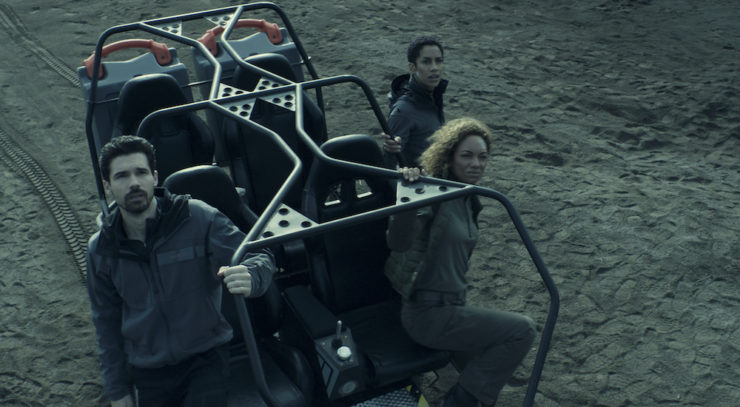
Millervision! In the first episode, there’s just a dollop of this peculiar, vaguely Tron-like view from the Investigator’s perspective, as he looks at Holden and sees … nothing that makes a ton of sense. A glowing ball. Now, he sees something that looks like a planet, pathways lighting up.
After the Miller interlude, we pick up with only the barest of pauses after the weird swarm. Could it have brought down the shuttle? Is it machine or organism? Scientist Elvi Okoye would like you to remember that what seems like a machine—it’s made of metal—might be just how life evolved here. She’s curious and practical and not all that scared and it worries me. The bug-things (space bees!) look like protomolecule tech, but everyone is clean.
The swarm seems to have come from the giant ruins, so it’s field trip time. But let’s take a quick trip around the rest of the system first.
In the Belt, things are also getting worse, as is clear from the dozens of bodies zooming through space—the former passengers of the Sojourner, a prospective UN colony ship which fell to pirates. Drummer sees no gain in this, but Ashford does: “It sends a message that the peace cannot change a century of anger overnight. And that there are Belters who still know how to hate.” And there are also Inners who still know how to be assholes, as the UN folks demonstrate when they tell Drummer that she ought to remember that Medina Station only exists by the good will of Inners. She and Ashford are out there doing the UN’s dirty work—and doing it as only people with a better understanding of Belter pirates can. They’re doing so much of that work themselves; do they trust no one else on Medina Station?
The key part of the Belt narrative this week is that Ashford figures out who’s behind the Sojourner deaths: Marco Inaros. Marco has a history with Naomi, and it’s not a nice one. Put a pin in that thought; we’ll surely come back to it later this season.
In a quiet scene aboard the most beautiful ship we’ve seen on this show, Avasarala mutters, “I fucking hate being right sometimes” when her assistant points out that the terrifying protomolecule tech on Ilus backs up her position that it’s too dangerous to go through the gates. The conversation she has with her lovely husband, Arjun, is deceptively normal, as they admire Mars’s aurora borealis. It’s about the work that goes into transforming Mars into something habitable, and is, again, about the Martian temperament and philosophy. It’s something bigger than any single generation, the Mars project. (“I like the things you see better than the ones I do,” Chrisjen says to her husband, almost sweetly.) But with the gates open, is that work worth it?
On Mars, Bobbie is not having a good week. The cops drag her in for questioning, which is an excuse to show off some creepy tech—they just copy her whole phone!—and remind us that Bobbie Draper can be very funny when she wants to be, and that she really believes in Mars. She came back to face dishonorable discharge for Mars. And now she’s being questioned about murder, trotted out as a prop for one of Avasarala’s heartfelt, bullshit speeches, and walking into a hot mess involving her nephew, his annoying friend, and a drug lab.
It’s so tough to watch Bobbie deal with all this mundane stuff when I want to see her proud and defiant and smart, but this is a smart way to bring her into this season, to show us Mars (and Avasarala) from her specific, complicated position. “Everything I’ve ever done has been for Mars,” Bobbie snaps at her interrogator, because her anger burns hottest in two situations: injustice, and people misusing their power. I wish she’d take Avasarala’s offer to come work for the sec-gen, but she so obviously can’t; she’s Martian, she has always wanted to be Martian, and yet obeying her conscience keeps making Mars think she’s too fond of Earthers. Working for Avasarala would be the easier thing, not necessarily the right thing, and she can’t do it.
But hey, at least she’s not on Ilus, where Amos figures out that someone blew up the shuttle landing pad. It also wasn’t the result of the swarm, but that’s are still an issue, and so is the structure they came from—one of hundreds like it, all of them reaching so far underground that the Edward Israel’s scanners can’t even see where they go. These things are well over a billion years old, which Okoye finds pretty weird since most everything that lives on the planet is much younger.
“When it landed here it would’ve killed everything,” Holden says, and Okoye is oddly unfazed when she says that evolution would have had to start over. Is this … not a big deal? The sheer size of these things freaks me out, and I’m not even standing next to them.
Ok, so Okoye also says, “That’s a lot of interacting systems. There’s no way to tell how they’ll mix,” which seems like a rather large warning sign. This planet has been home to whatever was there pre-structures, then structures and their builders, then whatever evolved in the wake of the structures, then whatever destroyed whoever built the structures, and then we’ve got humanity showing up and thinking we know what’s going on. Sounds like a party.
But who needs alien lifeforms to kill people when you’ve got Murtry? He wants the Belters who blew up the pad to pay (“or you all will”), which is unhelpful, but so is the Belter response, which is to get mad about how Inners always blame them for everything. The Expanse is very good at a lot of things, including suggesting that one of humanity’s greatest talents is to fight over how to handle problem A while the far more dangerous problem B looms in the background, ignored.
In just these two episodes, so many conflicts are in play: in the Belter factions; in the UN’s desire to control the Belt while claiming to work with them; in Mars’s obsession with punishing Bobbie for choices she made out of loyalty. After three seasons of interplanetary conflict, this season is very interested in the cracks within each of the system’s three players. The different Belter perspectives show up in Ashford and Drummer’s work, and in Marco’s appearance. Bobbie’s story shows the restrained conflict on Mars, which is liable to flare up in ways the military-minded authorities don’t expect. On Earth, Nancy Gao, who argued with Avasarala in the first episode and whose resignation is referenced here, represents different ideas about Earth’s future, and about what opportunities the gates offer to Earth’s wildly under-employed citizens.
In Avasarala’s speech, she’s right about one thing: humanity should be working together, not fighting itself. But those are just pretty words so long as she’s not being honest about what threats might be beyond the gates. I love her, but right now she’s part of the problem; she’s standing in the way of humanity even understanding what it needs to unite against.
So weird how people doing what they think is right keeps screwing up every situation further.
“We need to talk,” Miller says, showing up rudely in the middle of the night after a bit of Millervision that shows one of the structures glowing curiously. Miller needs Holden’s hands, needs Holden to listen; Holden seems constitutionally unable to realize that when Miller starts telling stories, that’s how he says what he means. The Investigator is dressed in a Miller suit, and uses Miller’s memories to spin things that are almost like fables, if Holden could just figure them out. (Miller: “It’s got a moral!” Holden: “I don’t give a shit.”)
The person that looks like Miller explains that he’s carrying around in his head pieces of the 10,000 people who died on Eros—their voices, their screams, the songs stuck in their heads. It’s almost enough to make you feel bad for the guy, were it not so apparent that his goals are not necessarily going to align with those of, well, humanity’s. I mean, he may need Holden’s hands, but he could’ve at least warned Holden that removing the root would close the door, right? There had to be some tale he could’ve used to transmit that info!
Of course, Holden gets out; of course, at the same time, things go from bad to worse. At the town, one of the most antagonistic Belters, Coop, lays into Murtry. His anger is palpable, and his complaints are true. The Inners destroyed their home, didn’t help them, and now that the Belters have built something on Ilus, “here come the fucking Inners to take it away again, like you always do.”
Murtry plays the “I didn’t blow up Ganymede so that’s not my problem” card, which sounds deeply familiar from so many bad faith arguments in which powerful people justify their actions. When Coop says it isn’t over, Murtry displays a moment of freakishly chill satisfaction when he says “Now that was a threat” and shoots Coop in the head.
You know what else is a threat? Lightning. Freaky lightning that goes in a straight line across a planet, starting from where Holden just helped Miller flip a switch.
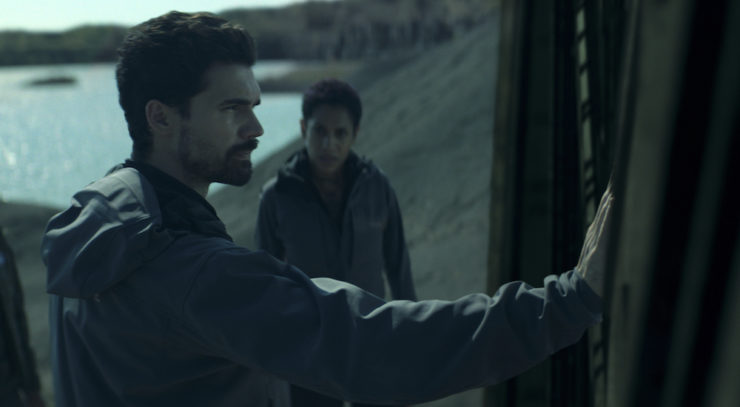
FLOATING THOUGHTS
- The corporate interests call the new planet New Terra, which is the least imaginative thing short of “Earth 2.” The Belters, on the other hand, call it Ilus, after a brother of Ganymede. (Why does Holden even know this?) It’s more than semantics; it’s mythology. Earthers just want the same thing again. Belters see something maybe familiar, but still different.
- I cannot believe Holden’s mom gives him Don Quixote, COME ON.
- Fayez’s observation that this planet has no geological activity is a bit … foreshadowy.
- The ship looks so good, I don’t even have words. All the effects and visuals are on point, especially the long, silent scene of everyone on the Roci preparing to land on Ilus, and the image of the ship itself coming down. Gorgeous.
- The consistency with which Naomi is always holding on to something is such a good touch, and a reminder that we are in territory just as unknown and dangerous as anything in space. They never slip on how much more difficult this world is for her—and how fast it starts to get even harder.
- Bless Amos, who fucks with Murtry simply and effectively by refusing to call him by the right name (“Who, Marty? He’s not my friend”); it’s an effective way for Amos to indicate that while he sees Murtry, he refuses to respect him.
- People are so blasé about this damn planet! Wading through space water! Just touching everything! It stresses me out!
- “One day I see a lizard, he eat a thing two time his own size by throw up he own stomach.” RIP, Coop, I almost admired your palpable sense of barely contained violence.
- “Personally, I don’t drink for taste.” Really, Alex? This to me was the tipoff that his chatting-up of Lucia wasn’t so much flirting as it was trying to get the lay of the land. But then he shuts down so fast when he meets her family.
- Amos getting drunk while swapping bullets (“It’s easy to make more”) for booze is the best. “I’m gonna sleep outside. It’s like Earth here, except less pollution, and more moons.” That’s not exactly what happens, but honestly I think he and Chandra Wei both deserved to blow off a little steam.
BOOK GEEK OUTS
Oh my god the Sojourner already, I am not ready. But I love the choices the showrunners are making for this adaptation—they’re all so smart. Lifting the seeds of Gods of Risk (and, honestly, improving that story) to bring in Bobbie and Mars’s unsettled state. Introducing Nancy Gao as a thorn in Avasarala’s side as a way to show that while Avasarala means well, she’s making too many choices out of fear. Bringing in Marco to keep the Belt in play and set the stage for the narratives of Nemesis Games (the action on Mars does this, too).
And, wisely, paring down on the coincidental character connections, by which I mean replacing Basia Merton with the random Jakob. Having Basia as a POV character made sense in the book, giving us a Belter perspective, but on screen his presence would be narrative clutter when there’s already so much going on. I also suspect the role of the Edward Israel and its staff will be considerably pared back, and there’s no suggestion that anyone else from previous stories is likely to turn up. Which, again, is smart: when you want to keep the rest of the systems in the story, you’ve got to make cuts somewhere. At the pace they’re going, it feels like Cibola Burn will fit in this season—maybe even with room to nod toward the next.
I’ll be back Monday with thoughts on episodes three and four!
Molly Templeton has been a bookseller, an alt-weekly editor, and assistant managing editor of Tor.com, among other things. She now lives and writes in Oregon, and spends as much time as possible in the woods. You can also find her on Twitter.










